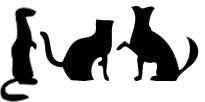Holiday Tips and Safety
/The holidays are a wonderful time of year when friends and family all come together for fun, food and festivities, but it can cause some issues for our animals if we aren't careful. Having a full house of people can be difficult to manage and sometimes things can go unnoticed and our four legged friends can take advantage of that! A multitude of things can happen over the holidays including gastrointestinal issues, ingesting toxic foods, pancreatitis and anxiety.
One of the biggest medical issues that we see is gastrointestinal upset, ranging anywhere from vomiting and diarrhea to intestinal foreign body. Pancreatitis is also common secondary to eating foods that are rich and delicious. Table scraps can be quite risky for our animals and shouldn't be given. You should also restrict them from licking the plate clean, that is where you will find most of the greasy fattening material. It is a good idea to talk to your house guests and ask them not to give any table scraps, especially for those animals that have allergies. Too much fatty food can become dangerous quickly, leading to a condition know as pancreatitis. Pancreatitis can affect both cats and dogs, it is very serious and needs to be addressed immediately. Symptoms of pancreatitis include: vomiting, diarrhea, lethargy, abdominal pain and fever. Make sure that your trash can is secure and can not be broken into. There will be many "goodies" in there that they will want-especially that delicious turkey carcass! Turkey bones are not good to give your animals. They can break and splinter easily causing gastroenteritis or even get lodged in their intestinal system and become a foreign body.
Now time for dessert! As most of us know chocolate is toxic and shouldn't be given to animals. Another really common issue we see with sweets is an artificial sweetener called xylitol. Xylitol is most commonly found in gum, low fat sweets, sugar free sweets and sugar free baked goods. If your animal has ingested this sweetener you'll need to contact your veterinarian, poison control or the local emergency facility.
This time of year it is very common to have a full house of people, which can be stressful not only for you but your four-legged friends. You should take certain precautions for them to make sure that they are ok and relaxed. If you have a cat or dog that is fearful of loud noises or too many people you should try to put them in a quiet area where they can be closed off and by themselves to avoid stressing them too much. If you have cats or dogs that are exceptionally fearful you can even try some plug in pheromones or collars with pheromones to help relax them as much as possible. We recommend using Feliway for cats, and Adaptil for dogs. It is a good idea to make sure that all of your animals have the proper identification on a collar just in case someone gets out accidentally.
'Tis the season to decorate and by all means have fun with it but try to be mindful of where and how you place your ornaments. Little ornaments can be swallowed, I recommend putting them up high on a tree. Fragile ornaments should also go up high. Some people still use tinsel - I say "not a good idea". Cats love to eat tinsel - drawn in by their glittering glow- foreign body in the making! Plants can be toxic so avoid plants such as lilies and poinsettias. Surprisingly even snow globes can be dangerous,. The liquid in a snow globe contains ethylene glycol which is the active and toxic ingredient in anti-freeze. Clean up quickly and thoroughly if breakage occurs. Ethylene glycol is very attractive to animals it is sweet but extremely dangerous even in small amounts. If you ever have any suspicion of ethylene glycol ingestion take them to your veterinarian immediately.
If you are planning on traveling for the holidays make sure that you take the proper precautions for safe travel. Updated vaccinations and proof of said vaccinations. If you are planning on boarding your animal at any point through the holidays you will be required by the boarding facilities to provide proof of up to date vaccines such as: Rabies, Distemper and Kennel cough. We recommend applying flea and tick preventative before boarding as your pet will not be the only one staying at that resort! Consider bringing a fecal sample to your veterinarian after you get your animal back to make sure that no gastrointestinal parasites were contracted. Flying with our animals is more popular than ever so a few things to consider for flight- contact your airline and make sure that you have all of the proper documentation from your veterinarian to fly. Some airlines will require a physical exam and health certificate 10 days before travel and some just simply want a vaccine certificate check with the specific airline ahead of time. Flying can be a health risk for some animals so you should always consult with your veterinarian before planning a trip to make sure your companion is safe to go.
During the holidays it is always good idea to know your vets office hours. If you live in Rhode Island Ocean State Veterinary Specialists are open 24/7 they are located in east East Greenwich their number is 401-886-6787. If you have any suspicion that your animal has ingested anything harmful or toxic contact the ASPCA poison control they are also available 24/7 they can be contacted at 1-888-426-4435. You can also go to their website as well: http://www.aspca.org/pet-care/animal-poison-control .
Happy Holidays from everyone at South Bay we hope that everyone has a happy, fun and safe holiday season!

